
Previous in Relation and Functions Next in Relation and Functions
Question Number 2675 by prakash jain last updated on 24/Nov/15
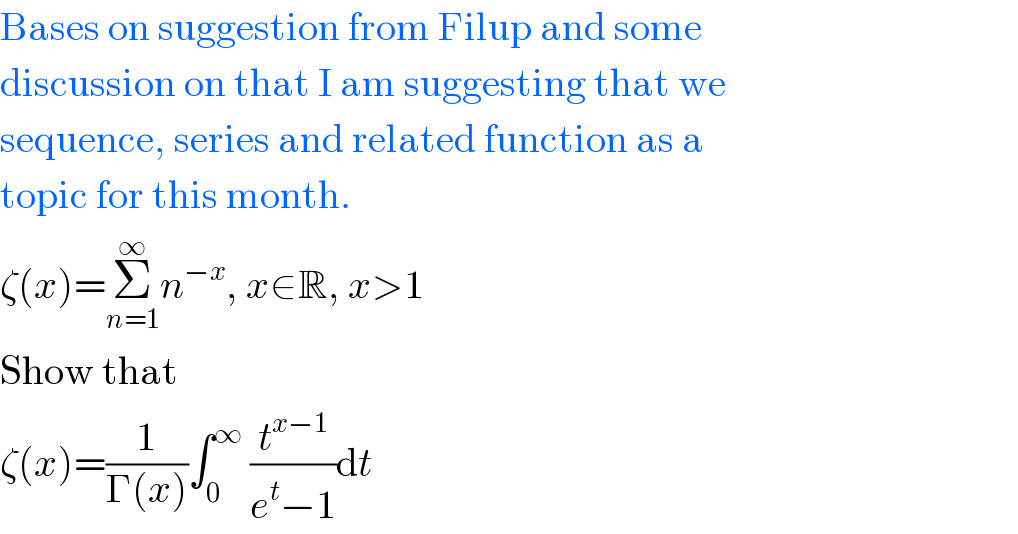
$$\mathrm{Bases}\:\mathrm{on}\:\mathrm{suggestion}\:\mathrm{from}\:\mathrm{Filup}\:\mathrm{and}\:\mathrm{some} \\ $$ $$\mathrm{discussion}\:\mathrm{on}\:\mathrm{that}\:\mathrm{I}\:\mathrm{am}\:\mathrm{suggesting}\:\mathrm{that}\:\mathrm{we} \\ $$ $$\mathrm{sequence},\:\mathrm{series}\:\mathrm{and}\:\mathrm{related}\:\mathrm{function}\:\mathrm{as}\:\mathrm{a} \\ $$ $$\mathrm{topic}\:\mathrm{for}\:\mathrm{this}\:\mathrm{month}. \\ $$ $$\zeta\left({x}\right)=\underset{{n}=\mathrm{1}} {\overset{\infty} {\sum}}{n}^{−{x}} ,\:{x}\in\mathbb{R},\:{x}>\mathrm{1} \\ $$ $$\mathrm{Show}\:\mathrm{that} \\ $$ $$\zeta\left({x}\right)=\frac{\mathrm{1}}{\Gamma\left({x}\right)}\int_{\mathrm{0}} ^{\infty} \:\frac{{t}^{{x}−\mathrm{1}} }{{e}^{{t}} −\mathrm{1}}\mathrm{d}{t} \\ $$
Commented byprakash jain last updated on 24/Nov/15
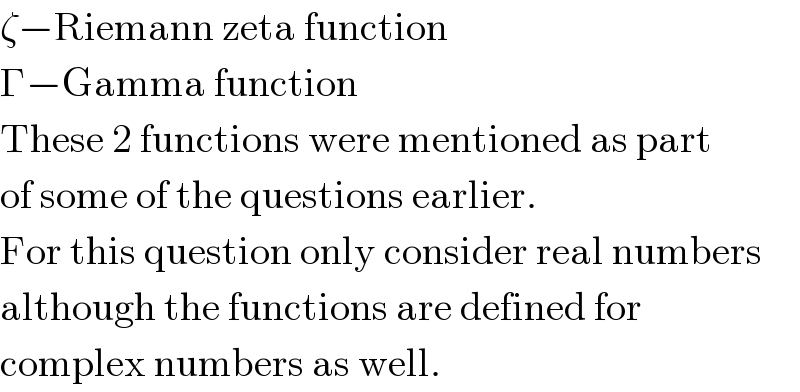
$$\zeta−\mathrm{Riemann}\:\mathrm{zeta}\:\mathrm{function} \\ $$ $$\Gamma−\mathrm{Gamma}\:\mathrm{function} \\ $$ $$\mathrm{These}\:\mathrm{2}\:\mathrm{functions}\:\mathrm{were}\:\mathrm{mentioned}\:\mathrm{as}\:\mathrm{part} \\ $$ $$\mathrm{of}\:\mathrm{some}\:\mathrm{of}\:\mathrm{the}\:\mathrm{questions}\:\mathrm{earlier}. \\ $$ $$\mathrm{For}\:\mathrm{this}\:\mathrm{question}\:\mathrm{only}\:\mathrm{consider}\:\mathrm{real}\:\mathrm{numbers} \\ $$ $$\mathrm{although}\:\mathrm{the}\:\mathrm{functions}\:\mathrm{are}\:\mathrm{defined}\:\mathrm{for} \\ $$ $$\mathrm{complex}\:\mathrm{numbers}\:\mathrm{as}\:\mathrm{well}. \\ $$
Commented byRasheed Soomro last updated on 24/Nov/15

$$\mathcal{I}\:{have}\:{only}\:{heard}\:{the}\:{names}\:{of}\:{reimann}\:{zeta}\:{and} \\ $$ $${gamma}\:{functions}!\:{Anyway}\:{no}\:{harm}\:{in}\:{trying}! \\ $$ $${By}\:{the}\:{way}\:{who}\:{will}\:{be}\:{the}\:{judge}? \\ $$
Commented byprakash jain last updated on 24/Nov/15

$$\mathrm{This}\:\mathrm{question}\:\mathrm{was}\:\mathrm{not}\:\mathrm{meant}\:\mathrm{to}\:\mathrm{be}\:\mathrm{a} \\ $$ $$\mathrm{challenge}\:\mathrm{just}\:\mathrm{learning}\:\mathrm{details}\:\mathrm{of}\:\mathrm{a}\:\mathrm{few} \\ $$ $$\mathrm{things}\:\mathrm{that}\:\mathrm{got}\:\mathrm{mentioned}\:\mathrm{earlier}. \\ $$
Commented byprakash jain last updated on 24/Nov/15
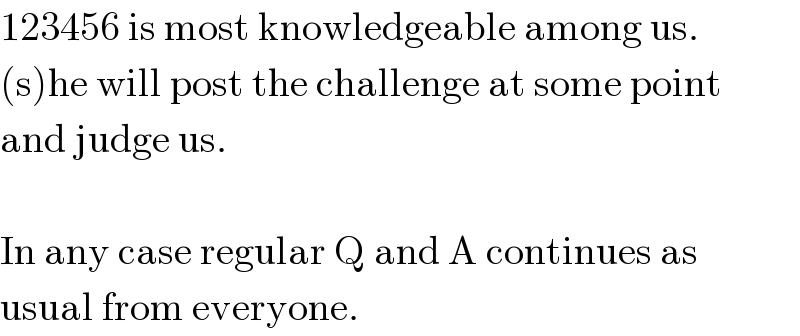
$$\mathrm{123456}\:\mathrm{is}\:\mathrm{most}\:\mathrm{knowledgeable}\:\mathrm{among}\:\mathrm{us}. \\ $$ $$\left(\mathrm{s}\right)\mathrm{he}\:\mathrm{will}\:\mathrm{post}\:\mathrm{the}\:\mathrm{challenge}\:\mathrm{at}\:\mathrm{some}\:\mathrm{point} \\ $$ $$\mathrm{and}\:\mathrm{judge}\:\mathrm{us}. \\ $$ $$ \\ $$ $$\mathrm{In}\:\mathrm{any}\:\mathrm{case}\:\mathrm{regular}\:\mathrm{Q}\:\mathrm{and}\:\mathrm{A}\:\mathrm{continues}\:\mathrm{as} \\ $$ $$\mathrm{usual}\:\mathrm{from}\:\mathrm{everyone}. \\ $$
Commented byYozzi last updated on 24/Nov/15

$${Cool}. \\ $$
Commented byYozzi last updated on 24/Nov/15

$${Is}\:{it}\:{dx}\:{or}\:{dt}\:{in}\:{the}\:{expression}\:\int_{\mathrm{0}} ^{\infty} \frac{{t}^{{x}−\mathrm{1}} }{{e}^{{t}} −\mathrm{1}}{dx}? \\ $$
Commented byprakash jain last updated on 24/Nov/15

$$\mathrm{d}{t}\:\mathrm{corrected}. \\ $$
Commented by123456 last updated on 01/Dec/15

$$\mathrm{24}/\mathrm{12} \\ $$
Answered by Yozzi last updated on 24/Nov/15
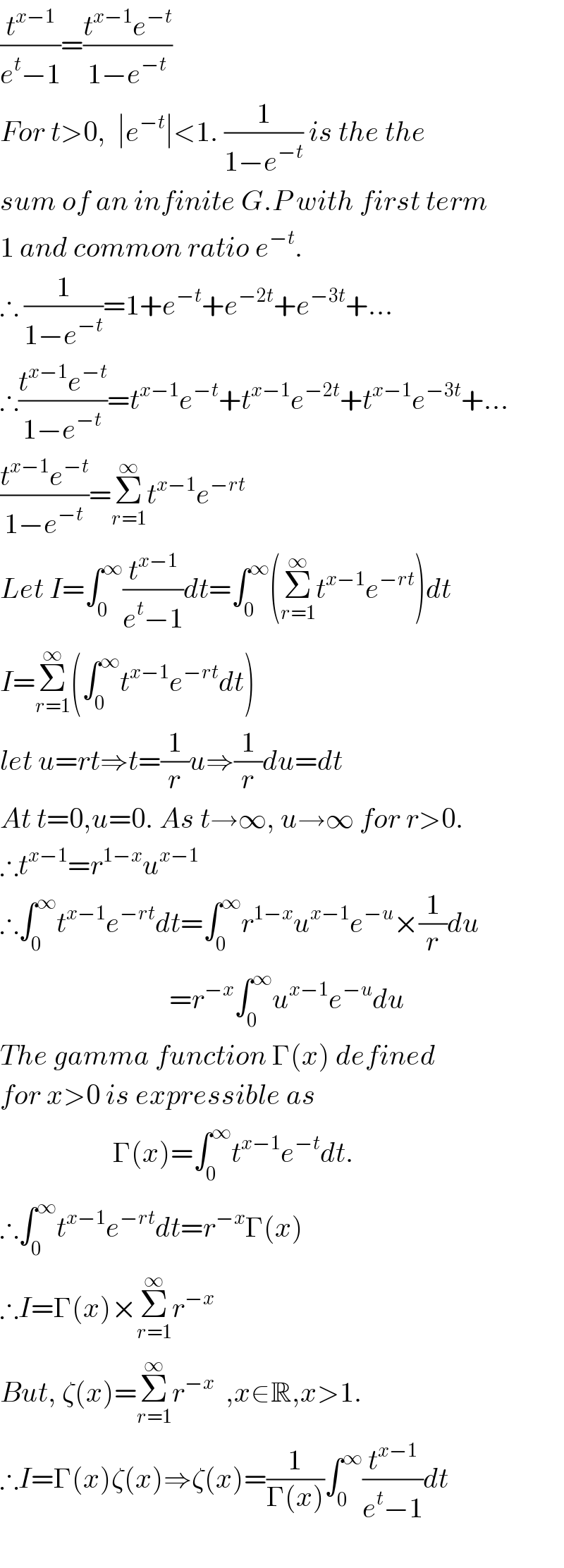
$$\frac{{t}^{{x}−\mathrm{1}} }{{e}^{{t}} −\mathrm{1}}=\frac{{t}^{{x}−\mathrm{1}} {e}^{−{t}} }{\mathrm{1}−{e}^{−{t}} } \\ $$ $${For}\:{t}>\mathrm{0},\:\:\mid{e}^{−{t}} \mid<\mathrm{1}.\:\frac{\mathrm{1}}{\mathrm{1}−{e}^{−{t}} }\:{is}\:{the}\:{the} \\ $$ $${sum}\:{of}\:{an}\:{infinite}\:{G}.{P}\:{with}\:{first}\:{term} \\ $$ $$\mathrm{1}\:{and}\:{common}\:{ratio}\:{e}^{−{t}} . \\ $$ $$\therefore\:\frac{\mathrm{1}}{\mathrm{1}−{e}^{−{t}} }=\mathrm{1}+{e}^{−{t}} +{e}^{−\mathrm{2}{t}} +{e}^{−\mathrm{3}{t}} +... \\ $$ $$\therefore\frac{{t}^{{x}−\mathrm{1}} {e}^{−{t}} }{\mathrm{1}−{e}^{−{t}} }={t}^{{x}−\mathrm{1}} {e}^{−{t}} +{t}^{{x}−\mathrm{1}} {e}^{−\mathrm{2}{t}} +{t}^{{x}−\mathrm{1}} {e}^{−\mathrm{3}{t}} +... \\ $$ $$\frac{{t}^{{x}−\mathrm{1}} {e}^{−{t}} }{\mathrm{1}−{e}^{−{t}} }=\underset{{r}=\mathrm{1}} {\overset{\infty} {\sum}}{t}^{{x}−\mathrm{1}} {e}^{−{rt}} \\ $$ $${Let}\:{I}=\int_{\mathrm{0}} ^{\infty} \frac{{t}^{{x}−\mathrm{1}} }{{e}^{{t}} −\mathrm{1}}{dt}=\int_{\mathrm{0}} ^{\infty} \left(\underset{{r}=\mathrm{1}} {\overset{\infty} {\sum}}{t}^{{x}−\mathrm{1}} {e}^{−{rt}} \right){dt} \\ $$ $${I}=\underset{{r}=\mathrm{1}} {\overset{\infty} {\sum}}\left(\int_{\mathrm{0}} ^{\infty} {t}^{{x}−\mathrm{1}} {e}^{−{rt}} {dt}\right) \\ $$ $${let}\:{u}={rt}\Rightarrow{t}=\frac{\mathrm{1}}{{r}}{u}\Rightarrow\frac{\mathrm{1}}{{r}}{du}={dt} \\ $$ $${At}\:{t}=\mathrm{0},{u}=\mathrm{0}.\:{As}\:{t}\rightarrow\infty,\:{u}\rightarrow\infty\:{for}\:{r}>\mathrm{0}. \\ $$ $$\therefore{t}^{{x}−\mathrm{1}} ={r}^{\mathrm{1}−{x}} {u}^{{x}−\mathrm{1}} \\ $$ $$\therefore\int_{\mathrm{0}} ^{\infty} {t}^{{x}−\mathrm{1}} {e}^{−{rt}} {dt}=\int_{\mathrm{0}} ^{\infty} {r}^{\mathrm{1}−{x}} {u}^{{x}−\mathrm{1}} {e}^{−{u}} ×\frac{\mathrm{1}}{{r}}{du} \\ $$ $$\:\:\:\:\:\:\:\:\:\:\:\:\:\:\:\:\:\:\:\:\:\:\:\:\:\:\:\:\:\:={r}^{−{x}} \int_{\mathrm{0}} ^{\infty} {u}^{{x}−\mathrm{1}} {e}^{−{u}} {du} \\ $$ $${The}\:{gamma}\:{function}\:\Gamma\left({x}\right)\:{defined} \\ $$ $${for}\:{x}>\mathrm{0}\:{is}\:{expressible}\:{as} \\ $$ $$\:\:\:\:\:\:\:\:\:\:\:\:\:\:\:\:\:\:\:\:\Gamma\left({x}\right)=\int_{\mathrm{0}} ^{\infty} {t}^{{x}−\mathrm{1}} {e}^{−{t}} {dt}. \\ $$ $$\therefore\int_{\mathrm{0}} ^{\infty} {t}^{{x}−\mathrm{1}} {e}^{−{rt}} {dt}={r}^{−{x}} \Gamma\left({x}\right) \\ $$ $$\therefore{I}=\Gamma\left({x}\right)×\underset{{r}=\mathrm{1}} {\overset{\infty} {\sum}}{r}^{−{x}} \\ $$ $${But},\:\zeta\left({x}\right)=\underset{{r}=\mathrm{1}} {\overset{\infty} {\sum}}{r}^{−{x}} \:\:,{x}\in\mathbb{R},{x}>\mathrm{1}. \\ $$ $$\therefore{I}=\Gamma\left({x}\right)\zeta\left({x}\right)\Rightarrow\zeta\left({x}\right)=\frac{\mathrm{1}}{\Gamma\left({x}\right)}\int_{\mathrm{0}} ^{\infty} \frac{{t}^{{x}−\mathrm{1}} }{{e}^{{t}} −\mathrm{1}}{dt}\: \\ $$ $$ \\ $$
Commented by123456 last updated on 24/Nov/15

$$\mathrm{nice} \\ $$
Commented byFilup last updated on 25/Nov/15

$${Awesome}!\:\mathrm{I}\:\mathrm{had}\:\mathrm{no}\:\mathrm{idea}\:\mathrm{how}\:\mathrm{to}\:\mathrm{do}\:\mathrm{this} \\ $$ $$\mathrm{one}!\:{S}\mathrm{o}\:\mathrm{simple}! \\ $$
Commented byRasheed Soomro last updated on 25/Nov/15
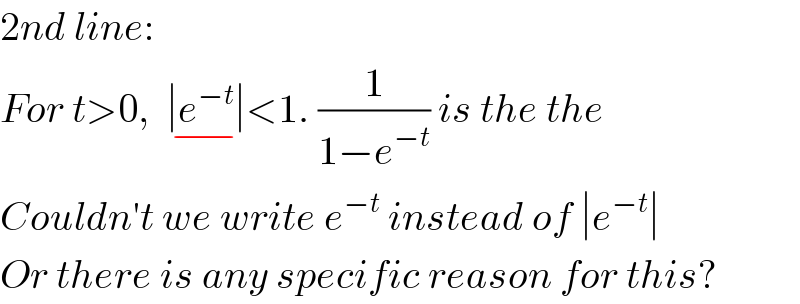
$$\mathrm{2}{nd}\:{line}: \\ $$ $${For}\:{t}>\mathrm{0},\:\:\underset{−} {\mid{e}^{−{t}} \mid}<\mathrm{1}.\:\frac{\mathrm{1}}{\mathrm{1}−{e}^{−{t}} }\:{is}\:{the}\:{the} \\ $$ $${Couldn}'{t}\:{we}\:{write}\:{e}^{−{t}} \:{instead}\:{of}\:\mid{e}^{−{t}} \mid \\ $$ $${Or}\:{there}\:{is}\:{any}\:{specific}\:{reason}\:{for}\:{this}? \\ $$
Commented byYozzi last updated on 25/Nov/15
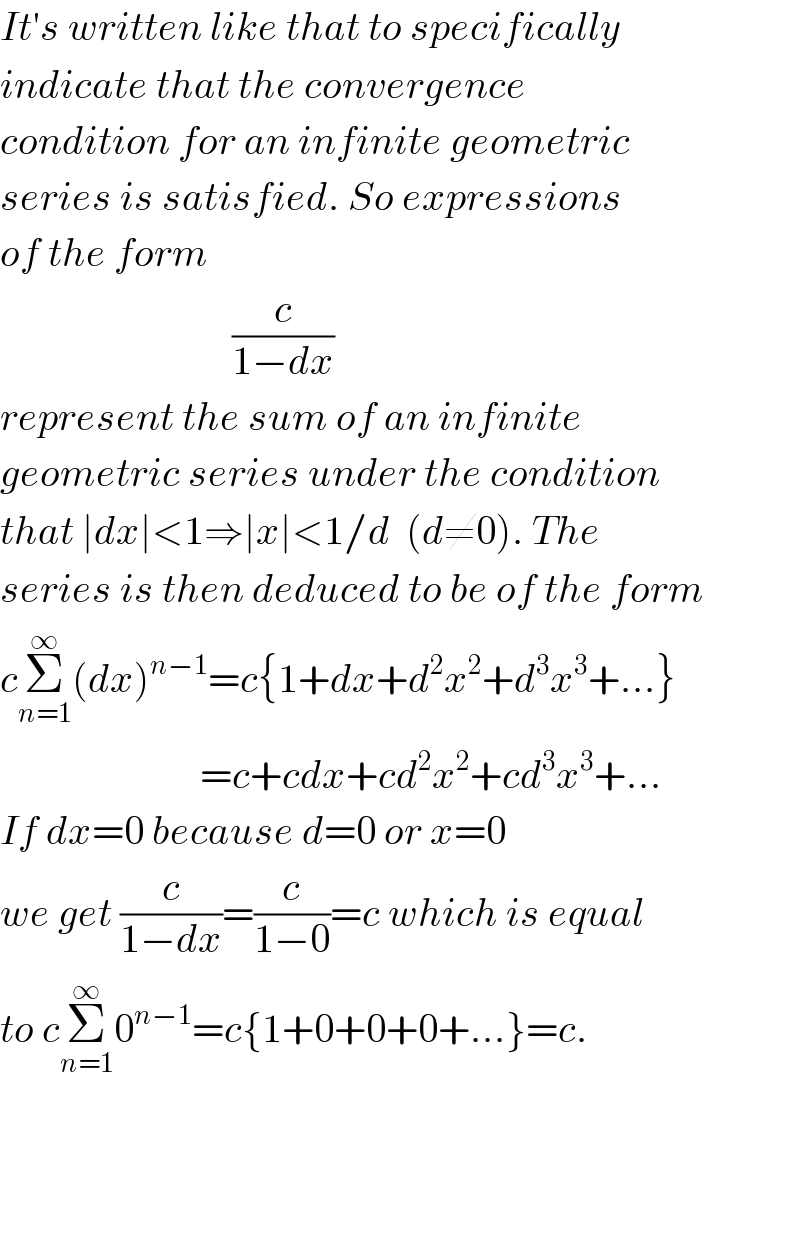
$${It}'{s}\:{written}\:{like}\:{that}\:{to}\:{specifically} \\ $$ $${indicate}\:{that}\:{the}\:{convergence} \\ $$ $${condition}\:{for}\:{an}\:{infinite}\:{geometric} \\ $$ $${series}\:{is}\:{satisfied}.\:{So}\:{expressions} \\ $$ $${of}\:{the}\:{form}\: \\ $$ $$\:\:\:\:\:\:\:\:\:\:\:\:\:\:\:\:\:\:\:\:\:\:\:\:\:\:\:\:\:\frac{{c}}{\mathrm{1}−{dx}}\:\: \\ $$ $${represent}\:{the}\:{sum}\:{of}\:{an}\:{infinite}\: \\ $$ $${geometric}\:{series}\:{under}\:{the}\:{condition} \\ $$ $${that}\:\mid{dx}\mid<\mathrm{1}\Rightarrow\mid{x}\mid<\mathrm{1}/{d}\:\:\left({d}\neq\mathrm{0}\right).\:{The} \\ $$ $${series}\:{is}\:{then}\:{deduced}\:{to}\:{be}\:{of}\:{the}\:{form} \\ $$ $${c}\underset{{n}=\mathrm{1}} {\overset{\infty} {\sum}}\left({dx}\right)^{{n}−\mathrm{1}} ={c}\left\{\mathrm{1}+{dx}+{d}^{\mathrm{2}} {x}^{\mathrm{2}} +{d}^{\mathrm{3}} {x}^{\mathrm{3}} +...\right\} \\ $$ $$\:\:\:\:\:\:\:\:\:\:\:\:\:\:\:\:\:\:\:\:\:\:\:\:\:={c}+{cdx}+{cd}^{\mathrm{2}} {x}^{\mathrm{2}} +{cd}^{\mathrm{3}} {x}^{\mathrm{3}} +... \\ $$ $${If}\:{dx}=\mathrm{0}\:{because}\:{d}=\mathrm{0}\:{or}\:{x}=\mathrm{0} \\ $$ $${we}\:{get}\:\frac{{c}}{\mathrm{1}−{dx}}=\frac{{c}}{\mathrm{1}−\mathrm{0}}={c}\:{which}\:{is}\:{equal} \\ $$ $${to}\:{c}\underset{{n}=\mathrm{1}} {\overset{\infty} {\sum}}\mathrm{0}^{{n}−\mathrm{1}} ={c}\left\{\mathrm{1}+\mathrm{0}+\mathrm{0}+\mathrm{0}+...\right\}={c}. \\ $$ $$\:\:\:\:\:\:\:\:\:\: \\ $$ $$ \\ $$ $$ \\ $$
Commented byRasheed Soomro last updated on 25/Nov/15

$$\mathcal{T}{h}^{{a}} {nk}\mathcal{S} \\ $$
